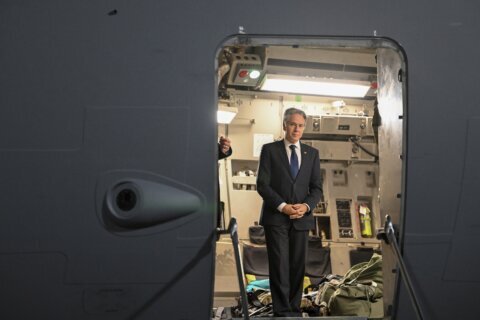COLOMBO, Sri Lanka (AP) — Marxist politician Anura Dissanayake won Sri Lanka’s presidential election over the weekend, dealing a blow to a political old guard that has been widely blamed for the unprecedented economic crisis that hit the South Asian island nation two years ago.
Dissanayake, whose pro-working class populist campaign won him youth support, secured victory over opposition leader Sajith Premadasa, the runner up; and incumbent President Ranil Wickremesinghe, who took over the country two years ago after its economy hit bottom.
Dissanayake is the leader of National People’s Power alliance, and of the Janatha Vimukthi Peramuna, or People’s Liberation Front, a Marxist political party that waged two unsuccessful armed insurrections in 1970s and 1980s to capture power through socialist revolution.
Early interest in politics
Born on Nov. 24, 1968 into an ordinary family in a paddy-growing central part of Sri Lanka, Dissanayake was politically active from his school days, taking part in student demonstrations against an agreement with India to grant a degree of self rule to Sri Lanka’s Tamil minority in an effort to resolve the demands for autonomy that later erupted into a decades-long civil war.
Dissanayake political involvement was further sharpened when he entered university to read for his science degree and joined the Socialist Students’ Union, the student wing of the JVP, which had already staged one armed insurrection in 1971 before giving up arms and entering politics.
In 1987, the JVP started its second armed insurrection after the government banned the movement, aiming at overturning the deal with India and overthrowing the government. Dissanayake went underground as the government stepped in to violently crush the insurrection, killing the group’s leader Rohana Wijeweera and nearly all of its top members.
Several thousands were killed by the JVP and government forces and their agents in the course of the insurgency and its suppression.
Parliamentary politics
Dissanayake entered public politics in 1993, working to rebuild the party under a new leader-in-exile, Somawansa Amarasinghe. The party won its first seat in Parliament in 1994, signalling its re-entry into democratic politics.
Dissanayake became national organiser of the Socialist Students’ Union in 1997 and the same year, he was added to to the Central Committee of the JVP. One year later, he joined the party’s politburo.
Dissanayake was elected to Parliament in 2000, and when the JVP entered an alliance with President Chandrika Kumaratunga, he briefly served as agriculture and irrigation minister.
That alliance was formed to oppose a cease-fire agreement signed between then-Prime Minister Ranil Wickremesinghe and the now-defeated Tamil Tiger rebels to resolve the separatist conflict that had blown into a full scale civil war.
Later, Dissanayake and the JVP backed former President Mahinda Rajapaksa to militarily defeat the rebels in 2009.
He was elected JVP leader in 2014, after a party schism in which a radical left wing broke off to form a new party.
A new coalition
Having realised that it was not possible to come to power through his party alone, Dissanayake formed the NPP in 2019, bringing together 21 groups including political parties, youth groups, women’s groups, trade unions and other civil society groups.
Since the formation of the coalition, Dissanayake has moved away from his far leftist stance. Although he remains head of a Marxist party, he now says that he supports a free market economy.
He ran for president as the head of the NPP for the first time in 2019, losing to Gotabaya Rajapaksa, who was forced to flee two years later because of protests driven by the country’s economic crisis.
Vows to end austerity and corruption
Dissanayake enters office with a raft of promises to improve standards of living and clean up government.
His main campaign theme was accountability, promising that politicians and officials will be held responsible for their actions. He’s also promised to end corruption and privileges for politicians and retired presidents.
But supporters are also counting on him to ease up on the punishing austerity imposed by the country’s deal with the IMF. He’s promised to keep the deal alive with changes, given its importance to the ongoing economic recovery. He’s also pledged to encourage local businesses instead of relying solely on foreign investments.
For the country’s Tamil minority, Dissanayake’s election offers little hope. During the campaign, he rejected devolving more power to the north and east, where most Tamils live, and investigating incidents during the civil war that U.N. investigators said could amount to war crimes. Tens of thousands of Tamil civilians were killed during the final months before the Tamil Tiger rebels’ defeat.
Copyright © 2024 The Associated Press. All rights reserved. This material may not be published, broadcast, written or redistributed.






